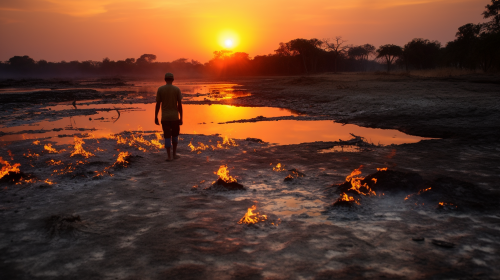
A surge in extreme weather across the northern hemisphere this summer is wreaking havoc on people’s health and the environment, according to the World Meteorological Organization (WMO). Countries ranging from the United States to China are grappling with severe heat.
Record land and sea temperatures have been documented alongside devastating wildfires, causing numerous fatalities and prompting evacuations of thousands.
Last week, data indicated that July could potentially be the warmest month ever recorded, as reported by scientists from the UN body and the European Commission’s Copernicus Climate Change Service.
‘The Unfortunate New Normal’
The WMO reported that China’s Xinjiang province recorded an all-time high of 52.2 °C on July 16. Phoenix, a city in the United States, also experienced an unprecedented 31 consecutive days of temperatures exceeding 110 °F, approximately 43.3 °C.
New records have also been set for sea surface temperatures with notable marine heatwaves in the Mediterranean and off Florida’s coast. Areas across the state, including Miami, are reeling under an extended and record-breaking heatwave.
Petteri Taalas, the WMO Secretary-General, stated, “The extreme weather, increasingly common in our warming climate, is severely impacting human health, ecosystems, economies, agriculture, energy and water supplies. This underscores the pressing need to swiftly and drastically reduce greenhouse gas emissions.”
He further emphasized that society must enhance its efforts to adapt to what is sadly becoming ‘the new normal.’
Wildfires and Displacement
New temperature highs for both day and night have also been reported in countries including France, Greece, Italy, Spain, Algeria, and Tunisia.
For instance, Spain’s Figueres registered a record-breaking 45.4°C on July 18, while the temperature soared to 48.2°C in Sardinia, Italy, on July 24. Algeria and Tunisia reported temperatures of 48.7°C and 49.0°C respectively on July 23.
Wildfires have led to the evacuation of hundreds from three Greek islands – Rhodes, Evia, and Corfu – starting from July 17. Fires have also resulted in several casualties in Algeria.
Arctic Fires
Hot, dry conditions have resulted in an early and intense wildfire season in Canada, displacing over 120,000 people.
The Canadian Interagency Forest Fire Centre reported that over 1.1 million hectares have already been consumed by fires, well above the 10-year average of roughly 800,000 hectares.
Smoke from the fires has polluted the air, impacting millions across North America. Additionally, a spate of fires has recently been observed within the Arctic Circle in Canada.
In light of the extreme weather, WMO and its partners are offering forecasts and warnings to protect lives and livelihoods, aligned with a UN initiative to ensure early warning systems coverage for everyone on Earth by 2027.


Sell Pre-made Account Profitable Account Sales